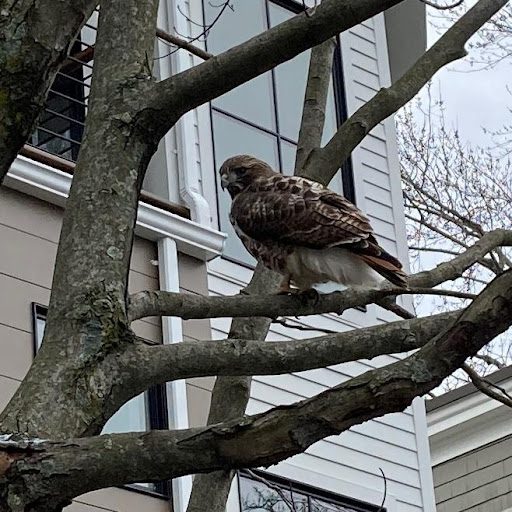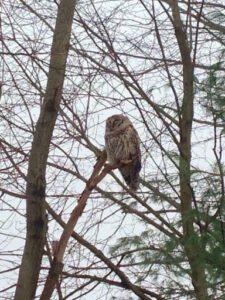Winter, mild and wild

It’s the middle of the winter. It’s a mild winter, here in metro Boston. We just has a wild day or two, but it really is milder than normal.
In winter, especially, there is a struggle for survival happening every day on our streets.
Predators and prey
Hawks:
Red-tailed hawks are more numerous in residential areas over the past ten years or so. They eat mostly small mammals, such as mice, rats, rabbits, voles, and squirrels. Sometimes, they will eat other birds or carrion. They are unlikely to harm a domestic cat of small dog. They are known to take koi from koi ponds.
Hawks are doing well around Boston this winter. They are safe from most other local predators. They are harmed from eating mice and rats who have been poisoned.
Coyotes:
Coyotes mate for life. The live about five years in the wild.
They mostly eat rodents, about 1800 a year! Most of the time, they stay away from people and dogs. They will eat pets, if the pets are alone outside. Unsupervised small dogs and cats are fair game. Your cats are not safe by climbing a tree. Coyotes can climb trees.
Coyotes get the same diseases as dogs. Transmission of parasites is commonly from dog poop. Coyotes are way down on the list of animals that get rabies. (Raccoons, skunks, and foxes are at the top. Then coyotes, then domestic cats.) There is “furious rabies,” which is dangerous; there is “dumb rabies,” which makes them disoriented. Raccoons with “dumb rabies” will be attractive to a coyote; if the coyote comes in contact, they will contract the dumb rabies.
Coyotes can be dangerous in January and February. They will attack larger dogs, even with people present. The coyotes are looking for mates, so their testosterone is up. Large dogs are competition.
Like hawks, coyotes die from being poisoned by eating poisoned rodents.
Owls
 Owls are more often heard than seen. They are mainly nocturnal. They will eat almost any living thing they can get their claws into. These birds are one of our most effective rodent control devices. They will eat squirrels, voles, rats, mice, muskrats, rabbits, opossum, bats, weasels, cats, snakes, frogs, beetles, grasshoppers, and a wide variety of birds.
Owls are more often heard than seen. They are mainly nocturnal. They will eat almost any living thing they can get their claws into. These birds are one of our most effective rodent control devices. They will eat squirrels, voles, rats, mice, muskrats, rabbits, opossum, bats, weasels, cats, snakes, frogs, beetles, grasshoppers, and a wide variety of birds.
Because they do not have a sense of smell, they will often scoop up small and baby skunks. A client of mine saw this owl eyeing her chickens in Lexington.
Like hawks and coyotes, owls die of poison from poisoned prey.
Bird feeders
This may be a wildly unpopular opinion: I don’t much like bird feeders. It is not that I hate birds. It’s because I like them. Here are my gripes about birdfeeders:
- If you start feeding birds, then stop, you are harming them. Birds get used to the open restaurant of your feeder. They don’t seek out other sources of food, since dinner is always served at your place. If you go away on vacation for two weeks, what happens to those birds?
- Squirrel feeders. Squirrels also depend on your birdfeeders, if you let them. It takes a good bit of engineering to make a bird feeder that squirrels can’t use.
- Rat feeders. ‘Nuf said.
- Cat feeders. If there are outdoor domestic cats in your neighborhood, your feeder is a source of entertainment and exercise for the local cats. Fine for the cats, bad for the birds.
 Hawk feeders. If your bird feeder is not squirrel-proof, the squirrels attract hawks. I saw this one about two blocks from my house. The squirrel that was about to be lunch ran away as I approached. The hawk who was none too pleased.
Hawk feeders. If your bird feeder is not squirrel-proof, the squirrels attract hawks. I saw this one about two blocks from my house. The squirrel that was about to be lunch ran away as I approached. The hawk who was none too pleased.
I wish all living things a good second half of the winter.
